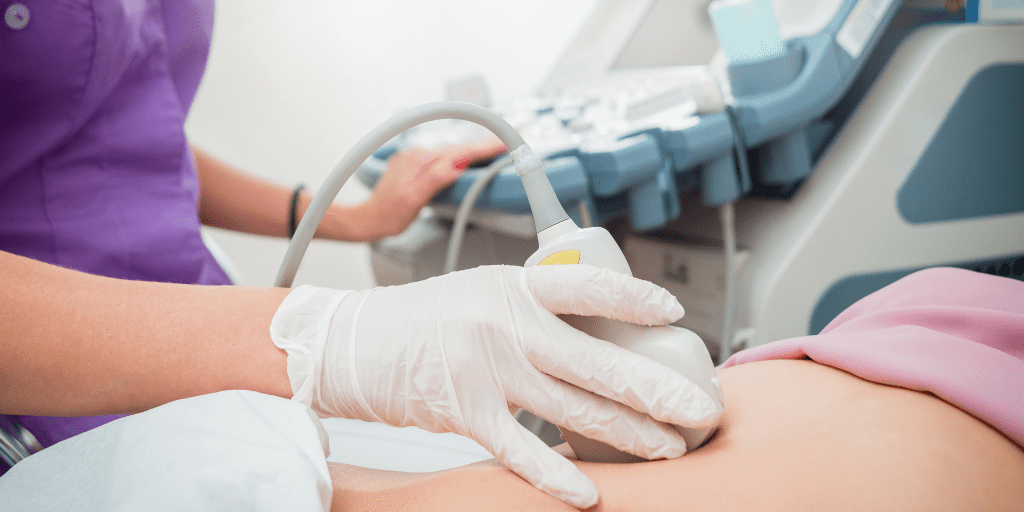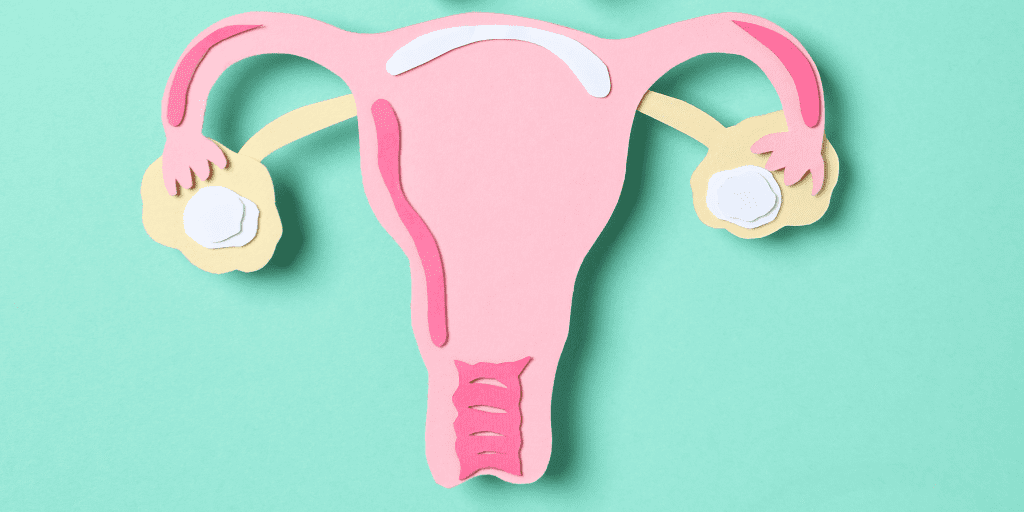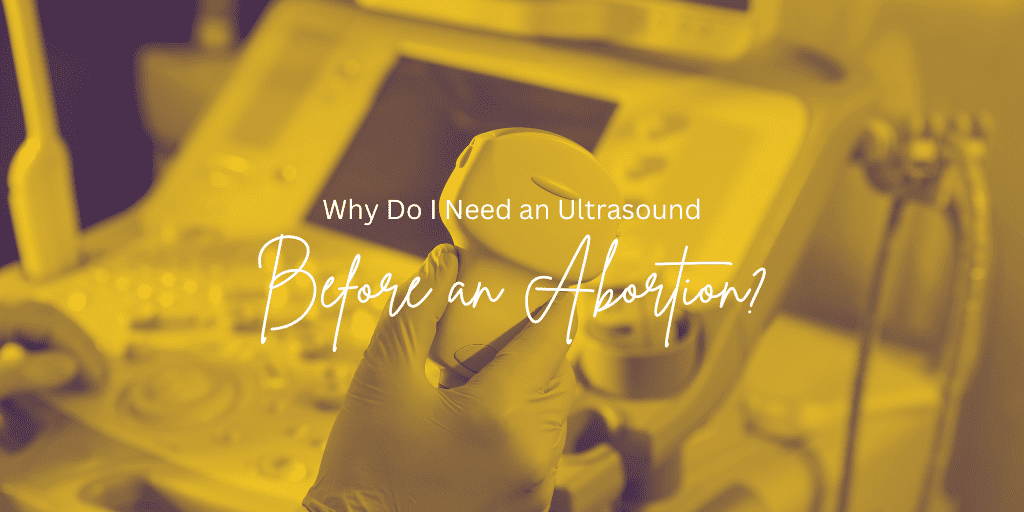Do I really need an ultrasound if I’m using the abortion pill?
If you are pregnant – even if you plan to have an abortion or use the abortion pill – it’s important to have an ultrasound.
We know – this may seem confusing. But there are important reasons for having an ultrasound. It’s a big factor in ensuring your health and safety. We’ll take a look at some of those reasons in this blog.
PS – At PLL, all of our services – including ultrasound – are free and confidential! You can schedule a free appointment through our website.
What is an ultrasound?
Let’s start with the basics: What is an ultrasound?
Mayo Clinic says, “Diagnostic ultrasounds use sound waves to make pictures of the body. Ultrasound, also called sonography, shows the structures inside the body.” [1] That’s still a fairly technical explanation.
Simply put, an ultrasound involves gel being applied to your skin. (In this case, it would be on your belly/lower abdomen.) A trained technician then presses a handheld device (a transducer) against the area and moves it around a bit. The images produced by this process are displayed on a screen. (In our office, they’re projected onto a large tv screen where you can see them if you choose. This is all done in a very private area.)

Let’s get back to why an ultrasound is important for your health. An ultrasound gives information about:
Viability
Viability – what’s that? Essentially, a viable pregnancy is one that appears capable of continuing to grow and develop on its own. A pregnancy test reveals if you are or are not pregnant. But an ultrasound gives you a good look at what’s going on inside your body in detail. This includes whether or not there is a heartbeat.
The pregnancy may not be viable if no heartbeat is detected. It’s not uncommon for women to experience miscarriage [2], in which case an abortion/the abortion pill would not be necessary.
The March of Dimes estimates that 10-20% of known pregnancies end in miscarriage. Most miscarriages occur during the first 12 weeks of a pregnancy. [3] Miscarriage can bring about a lot of emotions – even if your pregnancy was unplanned. Don’t be afraid to seek help if you experience feelings of grief or sadness regarding a miscarriage. There is a lot of information online about support, but sharing with a close friend can be helpful as well. [4]
Ready to schedule your free appointment to confirm your pregnancy? Use our online scheduler to do so!

Location
It might seem odd to need to “locate” your pregnancy. However, it is a necessary step to making sure you’re healthy.
A healthy, viable pregnancy travels from the fallopian tubes to reside in the uterus. Mayo Clinic has a detailed description of what happens during each stage of a viable pregnancy if you’d like to learn more about that. [5]
Some pregnancies could implant and begin to develop outside of the uterus. When this happens, it typically occurs in the fallopian tubes. This is called an ectopic pregnancy. [6]
An ectopic pregnancy is a big health risk to a pregnant woman. It’s considered a medical emergency. An ectopic pregnancy could be life-threatening if it isn’t treated immediately. [7] An ultrasound will locate the pregnancy in your body to rule out an ectopic pregnancy. [8] If you do have an ectopic pregnancy, you should not take the abortion pill, and you should get to your doctor or a hospital as soon as possible.

Gestation
Gestation [9] is a term for “how far along you are.” It’s important to determine how far along you are in order to choose the safest next steps for your situation. For instance, the abortion pill is not considered safe for women who have not had a period in the previous 9 weeks. [10]

Typically, gestational age is initially calculated based on the date of your last period. However, the most accurate gestational age is determined by measurements taken from an ultrasound. [11]
An ultrasound can help determine the gestational age of your pregnancy and therefore help determine what options are safe (with your well-being in mind!).

What now?
If you believe you might be pregnant, you can reach out to us to schedule a free appointment. We can confirm your pregnancy with a lab-quality test and an ultrasound at no cost to you. If you know you are pregnant and are not sure what to do next or just feel like you need some support, we are here for you, as well!
Ultimately, an ultrasound can give you the knowledge you need to feel equipped and confident about the decisions you’re facing. And we’re right here in your corner if you need some extra support.
Our services are always free and confidential.

You’re not alone.
You might feel like you’re facing this alone, especially if your pregnancy was unplanned. But many have walked this road before and have found peace and happiness, and you can, too.
At PLL, we believe you deserve to have all the facts about your pregnancy so you can make your decisions confidently. We also want you to have peace of mind when it comes to your health. Our compassionate, professional staff are here to help you get exactly that.
We’re here to help you as you choose the best next steps for your life. Please note that our office doesn’t provide or perform abortions, but we can provide the abortion information you need.
Sources:
- Ultrasound. Mayo Clinic. (2024, May 3). https://www.mayoclinic.org/tests-procedures/ultrasound/about/pac-20395177#:~:text=Overview,a%20device%20outside%20the%20body.
- Miscarriage. Mayo Clinic. (2023, September 8). https://www.mayoclinic.org/diseases-conditions/pregnancy-loss-miscarriage/diagnosis-treatment/drc-20354304
- Miscarriage. March of Dimes. (2024, October). https://www.marchofdimes.org/find-support/topics/miscarriage-loss-grief/miscarriage#:~:text=It’s%20estimated%20that%20between%2010%20to%2020,trimester%20before%20the%2012th%20week%20of%20pregnancy.
- Dealing with Grief After the… March of Dimes. (2024, October). https://www.marchofdimes.org/find-support/topics/miscarriage-loss-grief/dealing-grief-after-death-your-baby
- Pregnancy Week by Week. Mayo Clinic. (2025, March 18). https://www.mayoclinic.org/healthy-lifestyle/pregnancy-week-by-week/in-depth/prenatal-care/art-20045302#:~:text=Once%20it%20reaches%20the%20uterus%2C%20the%20morula%20becomes%20what’s%20called,Enlarge%20image
- Ectopic Pregnancy. Cleveland Clinic. (2023, January 18). https://my.clevelandclinic.org/health/diseases/9687-ectopic-pregnancy
- Ectopic Pregnancy. Mayo Clinic. (2022, Mar 12). https://www.mayoclinic.org/diseases-conditions/ectopic-pregnancy/symptoms-causes/syc-20372088
- Ectopic Pregnancy. Mayo Clinic. (2022, Mar 12). https://www.mayoclinic.org/diseases-conditions/ectopic-pregnancy/diagnosis-treatment/drc-20372093
- Gestational Age. Medline Plus. (2024, Nov.). https://medlineplus.gov/ency/article/002367.htm#:~:text=Gestational%20age%20is%20the%20common,37%20weeks%20are%20considered%20premature
- The Abortion Pill: How Does It Work? Focus on the Family. (2024, November). https://www.focusonthefamily.com/pro-life/abortion/the-abortion-pill-how-does-it-work/
- Methods for Estimating the Due Date. American College of Obstetricians and Gynecologists. (2025). https://www.acog.org/clinical/clinical-guidance/committee-opinion/articles/2017/05/methods-for-estimating-the-due-date#:~:text=Ultrasound%20measurement%20of%20the%20embryo,clearly%20in%20the%20medical%20record.

